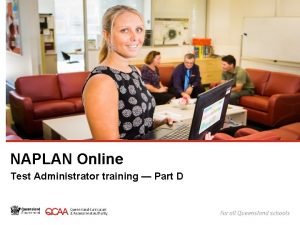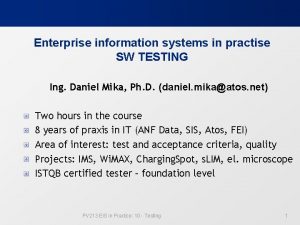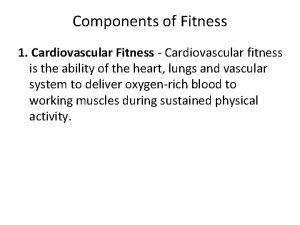Supporting Students Through Fitness to Practise Hisham Khalil






















- Slides: 22

Supporting Students Through Fitness to Practise Hisham Khalil and Liz Hellier Students matter Conference 17 April, 2018

Fitness to Practise workshop • Regulators’ guidance • Faculty policies • Examples of FTP Issues • FTP Scenarios (small group activity) • Summary

Nursing & Midwifery Council (NMC) • Prioritise people • Practise effectively • Preserve Safety • Promote professionalism and trust

Health Care Professions Council • Promote and protect the interests of service users and carers • Communicate appropriately and effectively • Work within the limits of your knowledge and skills • Delegate appropriately • Respect confidentiality • Manage risk • Report concerns about safety • Be open when things go wrong • Be honest and trustworthy • Keep records

General Optical Council • Listen to patients • Communicate effectively with your patients • Obtain valid consent • Show care and compassion for your patients • Keep your knowledge and skills up to date • Recognise, and work within, your limits of competence • Conduct appropriate assessments, examinations, treatments and referrals • Maintain adequate patient records • Ensure that supervision is undertaken appropriately and complies with the law • Work collaboratively with colleagues • Protect and safeguard patients, colleagues and others from harm • Ensure a safe environment for your patients • Show respect and fairness to others and do not discriminate • Maintain confidentiality and respect your patients’ privacy • Maintain appropriate boundaries with others • Be honest and trustworthy • Do not damage the reputation of your profession through your conduct • Respond to complaints effectively • Be candid when things have gone wrong

Faculty of Health and Human Sciences Fitness to Practice Procedure for Students are fit to practise and adhere to codes of conduct mandated by regulatory professions ‘Good health and good character’ Informal Stage 1 Stage 2 (Appeal to Dean) Stage 3

Examples of FTP Issues • • • Falsification of records/timesheets/expenses Poor attendance and engagement Unprofessional behavior Inappropriate use of Social media Harassment/bullying Academic misconduct. e. g Plagiarism Health issues; failure to disclose/engage with treatment Criminal behavior - conviction, caution or reprimand Drug or alcohol misuse Aggressive, violent or threatening behaviour Failure to disclose Confounding factors? • Mental/physical health • Breakdown of relationship with mentor



Fitness to Practise • https: //www. plymouth. ac. uk/uploads/pr oduction/document/path/8/8906/PUPS MD_Fitness_to_Practise_Policy_and_Pro cedure. pdf

Fitness to Practise • Clinical practise • Conduct and Professionalism • Health • Stage I: Emerging concerns • Stage II: Ongoing Concerns • Stage III: Urgent Concerns

Examples of Fitness to Practise Issues • Health issues; failure to disclose/engage with treatment • Criminal conviction, caution or reprimand • Drug or alcohol misuse • Aggressive, violent or threatening behaviour • Failure to disclose

Examples of Fitness to Practise Issues • Poor attendance and engagement • Persistent poor professionalism • Probity e. g. signing for someone when not there, forging an entry in an assessment • Unprofessional behaviour outside school/clinical placements • Harassment • Academic misconduct. e. g Plagiarism

Examples of Disclosures to Regulators

Medical student disclosure to the GMC • 7144 applications received for provisional registration in 2017, of which 938 included disclosure of one or more fitness to practise issues (13% of the total); • Of the 938 disclosures, 203 applications were referred to the GMC Registration Investigation Team; • In 2017, the GMC refused provisional registration to 7 applicants (from the original 7144 applications)

Medical student disclosure to the GMC Source: Fitness to practise matters that UK medical graduates declared to the GMC 2017

The Role of the Investigator

The Investigator • Awareness for FTP gidance by regulators and Faculty FTP policy • No conflict of interest • Impartiality • Report writing

FTP- Scenarios-Small groups

Case Study I (FHHS)

Case Study II (FMD)

Summary
 Dr hisham khalil
Dr hisham khalil Dr omar khalil
Dr omar khalil Sobia khalil
Sobia khalil Khalil gibran citation
Khalil gibran citation Feliz cumpleaños gibran
Feliz cumpleaños gibran Shaaban khalil
Shaaban khalil Dr akhtar khalil
Dr akhtar khalil Khalil gibran quand l'amour vous fait signe
Khalil gibran quand l'amour vous fait signe Nephroscelerosis
Nephroscelerosis Khalil coe
Khalil coe Khalil yazdi
Khalil yazdi Administration.assessform.edu.au
Administration.assessform.edu.au You shoould not go out.....it's raining heavily
You shoould not go out.....it's raining heavily Presentation, practice production
Presentation, practice production Practise ing hali
Practise ing hali Practise the dialogue
Practise the dialogue Safe dance practice
Safe dance practice Caaspp practise test
Caaspp practise test Practise ving
Practise ving Rfp best practise
Rfp best practise Health-related skill
Health-related skill Interno rizal
Interno rizal Chapter 4 preventing injuries through fitness
Chapter 4 preventing injuries through fitness











































